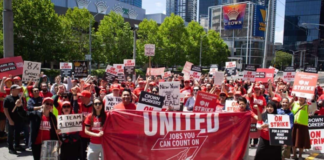Solidarity held its annual decision making conference over the weekend of February 7 and 8. With the world economy facing its most serious economic crisis since the Second World War, the conference began with discussion of the protests shaking Europe and the Rudd government’s response here with its economic stimulus packages.
Conference agreed that the economic crisis will be the central issue shaping global and domestic politics for the immediate future. It is generating ideological turmoil with the credibility of neo-liberalism, the free market and the capitalist system itself, called into question. Solidarity committed to making a greater effort to intersect with these ideological debates and to find opportunities to advance socialist solutions to the crisis. And while we should not expect demonstrations on the scale of places like France or Greece to be replicated here, conference agreed that we will need to relate to struggles around jobs and redundancies, factory closures or issues such as the ABC Learning collapse and government spending on services.
A key point of discussion was around how we pitch our criticisms of the Rudd government, and how willing those who voted for him are to criticise and demand more from Rudd. There was common agreement that we have to relate to people who are critical but may still support the government. But delegates underlined the importance of putting the case for campaigning to force change from Rudd and relating to those who are not just critical but are willing to fight back against the government.
Other sessions discussed the ongoing campaigns around the NT intervention, climate change and the Gaza war, and affirmed that leading and building the social movement struggles continues to be the starting point for the organisation’s work.
The conference elected a standing national committee as the leadership body of the organisation, and an editorial committee to oversee production of Solidarity.





